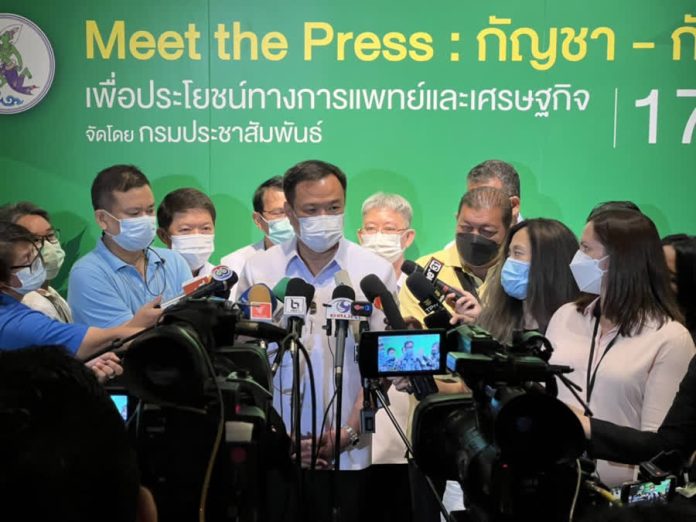The Kingdom of Thailand has stressed that legalizing cannabis is only meant to enable the products for medical and economic purposes while giving people alternative treatments for various illnesses.
The aspiration was emphasized as the Public Relations Department (PRD) organized a meet-the-press event, to create an understanding of Thailand’s intention regarding the legalization of cannabis and hemp for medical purposes.
According to Deputy Prime Minister and Public Health Minister Anutin Charnvirakul, the government had worked vigorously to legalize the herbs. It is the focus of the move to allow people to benefit from the medicinal properties of cannabis and hemp. Both plants have long been used as traditional medicines and alternative healthcare products, despite their prior status as narcotic substances.
He noted that the number of people who have fallen ill from cannabis consumption is remarkably low, despite concerns from many sides. The minister also underlined that understanding is crucial in responsible cannabis utilization.
The Minister also spoke about the PlookGanja mobile application and website which have already been visited more than 46 million times at the time of this report. Citing information from the ministry, the minister said about 1.1 million have already made a request to plant ganja at home.
PlookGanja mobile application and website provide the latest information about cannabis and hemp, their benefits, as well as related regulations governing their uses, to name a few. The online platform is being updated regularly, according to the minister.
Anutin gave his assurance that cannabis and hemp do not pose an impact on the health of the members of the public. He pointed out that the number of people who are under drug rehabilitation is mostly from narcotics, with only a fraction of that number being addicted to cannabis. Cannabis is not as addictive as alcohol or cigarettes, he stressed.
Minister Anutin hopes the plants will reduce reliance on drug imports along with the trade deficit with trading partners. He also estimated that the cannabis industry will generate at least 1.5 billion USD for Thailand, with room to grow in the future.
Additionally, the Minister said that his ministry already has regulations preventing the sales of cannabis to vulnerable groups which include children aged below 20, pregnant women, and lactating mothers.
Anutin also mentioned that Malaysia is considering allowing cannabis use for medical purposes. Health ministers of Thailand and Malaysia will next week meet to exchange views on the matter.
Other nations are moving in the same direction, such as Germany which will allow recreational use. The nation views that legalizing the products will allow the government to control the manufacturing process as well as the quality.
Since 2019, cannabis and hemp have been used more widely. The use of these herbs has been closely monitored to ensure effectiveness and safety. Furthermore, they have so far contributed to generating at least 28 billion baht of revenue in the related industry this year, according to the Public Health Minister.
Anutin emphasized that the government maintains its stance that the legalization of cannabis and hemp is never meant for recreational purposes. Several legal measures have already been established to prevent children from getting their hands on these plants, as well as to regulate shops offering cannabis-infused food and drinks. He stressed that businesses must have an appropriate permit to offer such products.
Meanwhile, PRD Director-General Lt. Gen. Sansern Kaewkamnerd, clarified that the meet the press event is designed to giving a platform for local and foreign members of the press to exchange ideas about the matter. It is expected that their opinions will also reflect public opinions on legalizing cannabis products. He underlined the intention of the administration to use cannabis and hemp constructively which will yield a tremendous benefit for the nation in terms of medical and economic standpoints.
He emphasized that the government continues its effort to make a correct understanding of the plants in all aspects.
During the event, Panthep Puapongpan, a spokesperson for the cannabis-and-hemp draft bill committee, gave an overview of the bill. He mentioned that the existing regulations from the Ministry of Public Health are already effective, as the number of patients suffering from cannabis misuse has actually declined when compared with the pre-cannabis-legalization period.
Panthep stated that many countries have legalized cannabis, with varying degrees of usage. Thailand has not done anything that no one does. Cannabis regulations from the ministry already regulate the use of the plants, also not allowing the flowers, without the need to enact the law on narcotics.
He pointed out that the addictive rate of cannabis among youngsters is double (17%), emphasizing the need to keep it away from children.
The spokesperson also said that the bill will allow household plantation of cannabis and hemp of no more than 15 plants. Planters need to inform authorities, and are not allowed to sell or give the herb to vulnerable groups.
Permits are required for those who look to do cannabis businesses, said the spokesperson. He added that permits can be requested as long as they are Thais or Thai juristic persons. The bill also bans the sales and consumption of cannabis products in various places such as educational institutes and temples. The latter is designed to protect people from unwanted consumption. The bill will not allow people under the influence of ganja to drive vehicles.
The bill will soon be proposed to the parliament.
A panel discussion was also being held to dive deeper into such topics as the economical benefit of cannabis and hemp, the method of processing the plants, regulations governing the use of these herbs, and the appropriate way for food and drink vendors to integrate cannabis and hemp into their offerings.
Later in the day, members of the press visited the drug factory of the Government Pharmaceutical Organization in Rangsit of Pathum Thani province. They witnessed first handed the manufacturing of cannabis-based medicines, whose process follows international standards.



